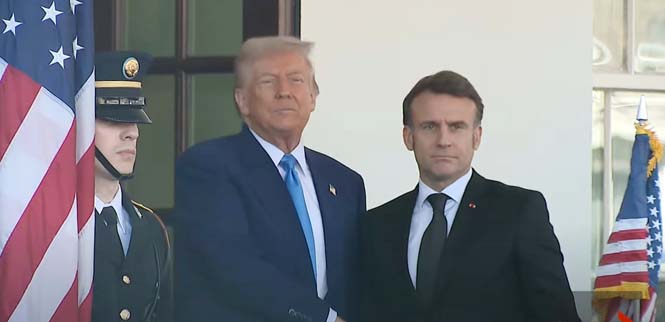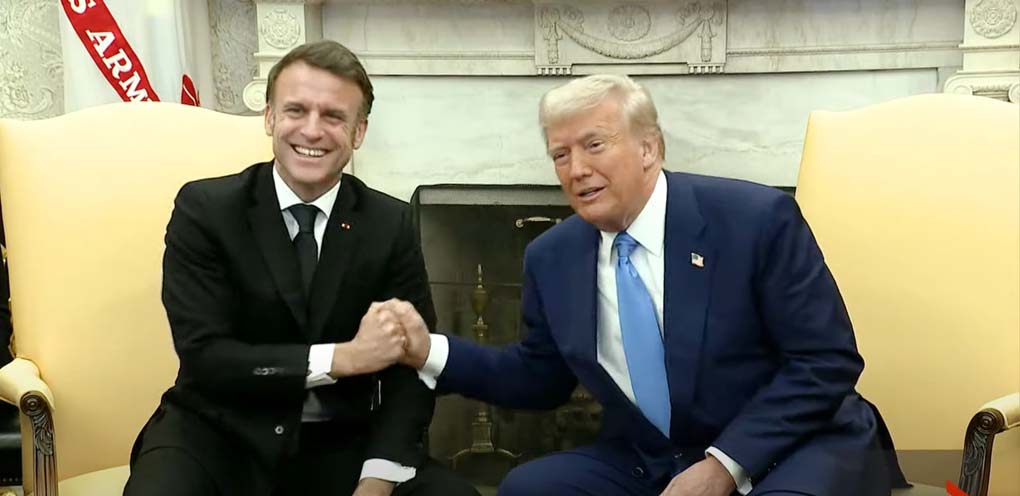Introduction
When Donald Trump and Emmanuel Macron grasped hands in the Élysée Palace this week, the action represented more than just diplomatic courtesy—it signified a turning point for a transatlantic alliance frayed by trade conflicts, climate policy disputes, and different points of view on world security. Against a backdrop of Europe’s need to confirm U.S. connections, the leaders’ conversations surprisingly turned to Syria’s chaotic political changes, where a recently installed temporary prime minister and split rebel groups are redefining the boundaries of a ten-year struggle. The high-stakes conference, its consequences for Middle East peace, and the human cost of Syria’s relentless crisis are examined in this paper.
A Fraught Relationship Revisited
Trump and Macron’s rapport has long been a study in contrasts. From Trump’s 2017 withdrawal from the Paris Climate Accord—a move Macron called a “mistake for the future”—to French criticism of U.S. sanctions on Iran, tensions have simmered. Yet, as Reuters notes, both leaders share a pragmatic streak. Macron, Europe’s de facto diplomatic bridge-builder, has quietly courted Trump’s support on shared priorities: countering China’s economic influence and reforming NATO.
“We’ve had our disagreements, but the strength of our alliance isn’t defined by perfection,” Macron remarked during a joint press conference, a nod to his balancing act. Trump, in turn, praised France’s military contributions, hinting at “big things ahead” for joint defense initiatives.
Syria’s Unseen Chessboard
While trade and NATO dominated headlines, behind closed doors, Syria’s evolving crisis emerged as a focal point. Days before the meeting, Syria’s opposition coalition, headquartered in Turkey, appointed interim Prime Minister Abdul Rahman Mustafa—a rebel-backed leader tasked with unifying fractured factions. His rise, as Al Jazeera reports, follows months of infighting among groups vying for influence in Idlib, Syria’s last major rebel stronghold.
For Macron, stabilizing Idlib is personal. France has funneled aid to Syrian opposition groups since 2018, viewing them as a counterweight to Bashar al-Assad’s regime and Russian influence. Trump, however, has been inconsistent, abruptly withdrawing troops in 2019 only to later authorize strikes against Assad-linked forces. “The U.S. and Europe need a coherent strategy,” argues Randa Slim of the Middle East Institute. “Otherwise, Idlib becomes a tinderbox for extremism.”

The Human Toll: Voices from the Rubble
Beyond geopolitics, Syria’s conflict has etched itself into the lives of millions. In Idlib’s overcrowded camps, families like the Al-Hassans grapple with dwindling supplies and airstrikes. “My children ask if the war will ever end,” says mother-of-four Lina Al-Hassan, her voice trembling in an interview with The Guardian. “I have no answers—only hope that foreign leaders remember we exist.”
Local aid worker Ahmed Mahmoud, operating near the Turkish border, paints a dire picture: “Clinics lack antibiotics. Schools are rubble. Every day, more families arrive with nothing.” His account aligns with UN data citing 2.8 million displaced in northwest Syria—a crisis compounded by COVID-19 and economic collapse.
Rebel Divisions and International Gambits
Mustafa’s appointment has exposed fissures within the Syrian opposition. Hardline groups like Hayat Tahrir al-Sham (HTS) reject his authority, while moderates hope his technocratic background will attract Western support. “Without unity, we’re just delaying defeat,” says defected Syrian army colonel Ammar al-Zahwi, now advising opposition forces.
For Europe, the stakes are high. A collapse of Idlib could trigger another refugee wave, straining EU borders. Macron has lobbied Trump to maintain humanitarian aid and consider no-fly zones—a proposal the U.S. president has yet to endorse. Meanwhile, Russia and Turkey, brokering their own fragile truce, watch warily.
Trade, Tech, and the China Factor
The leaders’ dialogue also veered into economic territory. With the EU and U.S. trading $1.3 trillion annually, Macron pressed for a truce in Trump’s long-running tariff war, which has targeted French wine and aerospace. A breakthrough seems unlikely, but both sides signaled openness to a digital tax compromise.
Notably, China’s shadow loomed large. Trump praised Macron’s push for European “strategic autonomy” in tech—a nod to France’s Gaia-X cloud initiative, which aims to reduce reliance on U.S. and Chinese platforms. “We’re allies, not satellites,” Macron asserted, a subtle rebuke of both American and Chinese hegemony.

Climate Policy: An Unbridgeable Gulf?
On climate change, however, divisions flared. Hours after Macron touted Europe’s Green Deal, Trump reiterated his skepticism, calling the Paris Accord a “job killer.” Yet, as Politico highlights, French officials hint at quiet cooperation on nuclear energy and carbon capture—areas where U.S. innovation aligns with EU goals.
What’s Next for US-Europe Relations?
Analysts caution against overstating the meeting’s outcomes. “This is about damage control, not renaissance,” says Brookings Institution’s Thomas Wright. Still, with Biden leading U.S. polls, Europe senses a window to reset ties. For Macron, success means locking in commitments that outlast November’s election.
In Syria, the interim government’s fate hinges on foreign backing. Mustafa’s team has appealed for EU funds to restore utilities in rebel zones—a bid to win grassroots legitimacy. But without U.S. military backing, even modest gains may crumble.
Conclusion: A Fragile Equilibrium
As Trump departed Paris, the summit’s legacy remained uncertain. For Syrians, the path forward is bleaker still. “We’re tired of being pawns,” says Lina Al-Hassan. Her words underscore a bitter truth: in the halls of power, human suffering often plays second fiddle to strategy.
Yet, in the delicate dance of diplomacy, even small steps matter. If Trump and Macron’s meeting yields sustained aid for Idlib or a tariff ceasefire, it could signal a fragile—but vital—partnership reboot. For now, the world watches, waits, and hopes.
Related Video (Video Link)
Sources:
- Reuters
- Al Jazeera
- The Guardian
- Politico
- UNHCR
- Middle East Institute
- Brookings Institution
Explore More
- BRICS Strike Back: Trump’s 150% Tariffs Ignite Dollar Nightmare
- Trump: No Gaza Takeover Plan, But He’d ‘Recommend’ It
- MBS Unites Arab Leaders On Gaza Strategy, Challenges Trump
- US, Russia Ignite Ukraine Peace Talks In Saudi—Ukraine Absent
- US, Russia Set for High-Stakes Talks in Saudi Arabia on Ukraine
- Trump Vows Ironclad Gaza Action This Saturday
- Hamas to Free 3 Hostages, Reviving Ceasefire Talks & Hope
- Trump’s Gaza Takeover Shocks: Netanyahu, Jordan’s Ceasefire Clash
- Hamas Halts Hostage Release, Accusing Israel of Ceasefire Breach
- Saudi Arabia Slams Netanyahu’s Proposal To Host Palestine: “A Political Stunt,” Says Riyadh

